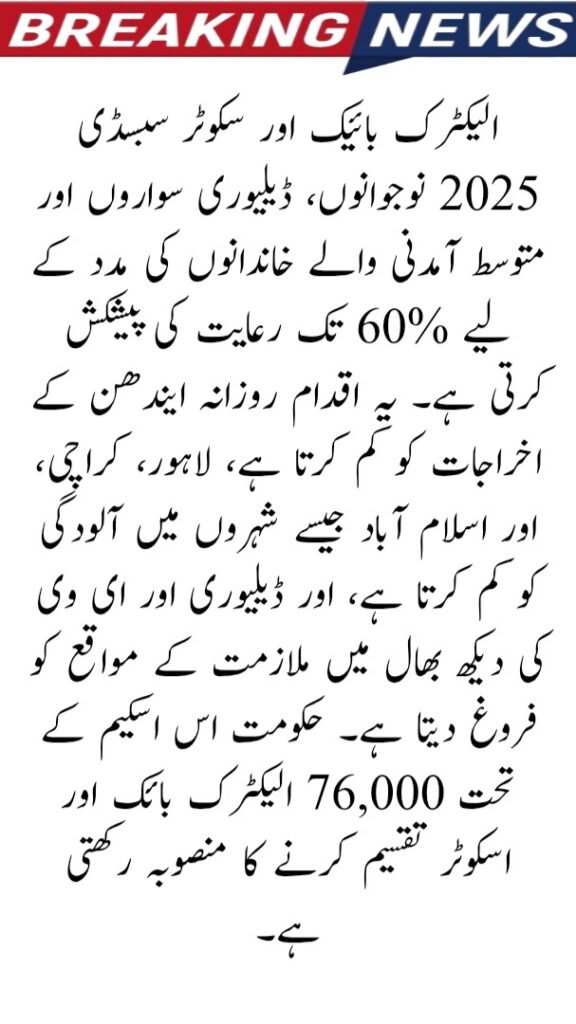PAVE Scheme Phase 2 – Get 60% Subsidy on Electric Bikes and Rickshaws

The Government of Pakistan has launched PAVE Scheme Phase 2 under the NEV Policy 2025–2030 to promote electric vehicles (EVs). This scheme will give a 60% subsidy on electric bikes, scooters, and rickshaws to make green transport affordable for citizens and small businesses.
Overview of PAVE Scheme Phase 2
PAVE stands for Pakistan Accelerated Vehicle Electrification. This is a five-year plan (2025–2030) that supports local production and usage of electric vehicles across the country. The scheme is managed by the Engineering Development Board (EDB) under the Ministry of Industries and Production.
The scheme will officially begin in November 2025, and applications will open shortly before that.
| Feature | Details |
| Scheme Name | PAVE Scheme Phase 2 |
| Official Start Date | November 2025 |
| Subsidy Amount | 60% off on EV bikes, scooters, rickshaws |
| Managed By | Engineering Development Board (EDB) |
| Total Vehicles Targeted | 76,000 bikes/scooters & 2,170 rickshaws/loaders |
| Main Goal | Promote clean mobility, reduce fuel use and pollution |
| Supported Under | NEV Policy 2025–2030 |
| Application Method | Online registration & digital balloting |
Subsidy Benefits for Electric Bikes and Scooters
The Electric Bike and Scooter Subsidy 2025 offers up to a 60% discount to support young people, delivery riders, and middle-income families. This initiative reduces daily fuel costs, cuts pollution in cities like Lahore, Karachi, and Islamabad, and promotes job creation in delivery and EV maintenance. The government plans to distribute 76,000 electric bikes and scooters under this scheme.

Support for Electric Rickshaws and Cargo Loaders
The government also supports small businesses and transporters through the Electric Rickshaw and Cargo Loader Scheme.
Focus groups:
- Small transport business owners
- Urban delivery services
- Women entrepreneurs in rural areas
Key benefits:
- Zero fuel costs and low maintenance
- Cleaner environment
- 2,170 units to be distributed under Phase 2
- Financial help for easy purchase and use
Monitoring and Transparency Process
To ensure fairness and quality, the government will:
- Use digital e-balloting (like Phase 1) for transparency
- Work with third-party evaluators for product verification
- Follow strict quality checks for all EVs
This ensures only safe and reliable vehicles reach citizens.
Implementation partners:
- PITB (Punjab Information Technology Board)
- Certified and approved EV manufacturers (OEMs)
NEV Policy 2025–2030 – Long-Term Green Goals
The NEV Policy is a national plan to shift from fuel-based to electric transport by 2030.
Main goals include:
- Promoting eco-friendly vehicles
- Supporting local EV production
- Creating battery recycling and charging stations
- Offering tax benefits and subsidies
- Building R&D capacity in Pakistan’s EV industry
This policy supports the Clean Mobility Program Pakistan, aiming for a healthier environment and fuel independence.
Economic and Environmental Impact
PAVE Scheme Phase 2 will help:
- Reduce Pakistan’s fuel import bills
- Create jobs in EV production, sales, and repair
- Cut pollution and noise levels in major cities
- Encourage innovation in battery and renewable energy tech
This aligns with Pakistan’s climate goals and the Sustainable Development Goals (SDGs).
Conclusion
PAVE Scheme Phase 2 is a big opportunity for Pakistani citizens to switch to electric transport. With a 60% subsidy, easy access through digital registration, and a focus on transparency and safety, the scheme is well-structured and future-ready.
If you want to be part of Pakistan’s clean transport revolution, apply through the official platform once the scheme opens in November 2025.
Official Link: https://pave.gov.pk
FAQs
1. What is PAVE Scheme Phase 2?
It is the second phase of Pakistan’s electric vehicle subsidy program, offering 60% off on electric bikes, scooters, and rickshaws under NEV Policy 2025–2030.
2. When will the scheme start?
Phase 2 is officially starting in November 2025. Applications will open shortly before that date.
3. Who can apply for this scheme?
Anyone with a valid CNIC. Special focus is on youth, small businesses, women entrepreneurs, and delivery workers.
4. How will the selection be done?
The government will use electronic balloting to select eligible applicants fairly.
Related Posts



















